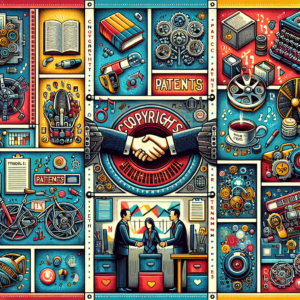Unraveling the Digital Copyright Crisis: Are Your Creations Safe?
[caption id="attachment_35119" align="alignnone" width="636"] Intellectual Property[/caption]
In an age where digital content is produced and shared at an unprecedented rate, the issue of copyright has become increasingly complex and contentious. Creators, from artists to writers, face a myriad of challenges in protecting their intellectual property in a landscape dominated by rapid technological advancements and shifting legal frameworks. This article delves into the current digital copyright crisis, exploring the implications of technology on creative ownership, the legal structures in place, the role of social media platforms, and strategies for creators to safeguard their work.
Understanding the Digital Copyright Crisis: An Overview of Current Challenges
The digital copyright crisis is characterized by a growing disconnect between traditional copyright laws and the realities of the digital age. As content is easily replicated and disseminated online, creators often find their works exploited without permission or compensation. The rise of user-generated content and the prevalence of digital platforms have exacerbated this issue, leading to widespread infringement and a lack of accountability. Many creators are left feeling vulnerable, as the very tools that enable them to share their work also facilitate unauthorized use. This crisis raises critical questions about the effectiveness of existing copyright laws and the need for reform to better protect creators in a digital landscape.
The Impact of Technology on Copyright Laws and Creative Ownership
Technological advancements have fundamentally altered the way creative works are produced, distributed, and consumed. The internet, social media, and digital platforms have democratized content creation, allowing anyone with access to technology to become a creator. However, this shift has also led to a dilution of creative ownership, as works can be easily copied, modified, and shared without the original creator's consent. The rise of artificial intelligence (AI) and machine learning further complicates the issue, as these technologies can generate new content based on existing works, blurring the lines of authorship and ownership. As a result, copyright laws struggle to keep pace with these rapid changes, leaving many creators uncertain about their rights and protections.
Key Legal Frameworks Governing Digital Copyright in the Modern Era
In response to the challenges posed by the digital age, several key legal frameworks have emerged to govern copyright in the online environment. The Digital Millennium Copyright Act (DMCA) in the United States, for example, provides a mechanism for copyright holders to protect their works from unauthorized use while also establishing safe harbors for online service providers. Similarly, the European Union's Copyright Directive aims to modernize copyright laws to better reflect the realities of the digital marketplace. However, these frameworks are often criticized for being outdated or insufficient, as they may not adequately address the complexities of digital content sharing and the rapid evolution of technology. As such, ongoing discussions about reforming copyright laws are essential to ensure that they effectively protect creators' rights in the digital age.
The Role of Social Media Platforms in Protecting Creative Works
Social media platforms play a dual role in the digital copyright crisis. On one hand, they provide creators with a powerful means to share their work and reach a global audience. On the other hand, these platforms are often criticized for their inadequate measures to protect users' intellectual property. While many platforms have implemented copyright management tools, such as content identification systems, these solutions are not foolproof and can lead to disputes over ownership and fair use. Additionally, the sheer volume of content uploaded daily makes it challenging for platforms to monitor and enforce copyright protections effectively. As a result, creators must navigate a complex landscape where their rights may be compromised, highlighting the need for stronger collaboration between creators and social media companies to enhance protections for creative works.
Strategies for Creators to Safeguard Their Intellectual Property Online
In light of the challenges posed by the digital copyright crisis, creators must take proactive steps to safeguard their intellectual property. One effective strategy is to clearly mark their works with copyright notices and watermarks, signaling ownership and deterring unauthorized use. Additionally, creators should consider registering their works with copyright offices, as this can provide legal advantages in the event of infringement. Utilizing digital rights management (DRM) tools and licensing agreements can also help protect creative works from unauthorized distribution. Furthermore, creators are encouraged to educate themselves about their rights and the legal frameworks governing copyright, enabling them to navigate potential infringements more effectively. By adopting these strategies, creators can better protect their intellectual property in an increasingly complex digital landscape.
Future Directions: Navigating the Evolving Landscape of Digital Copyright Protection
As the digital landscape continues to evolve, so too must the approaches to copyright protection. Future directions may include the development of more adaptive legal frameworks that can respond to technological advancements and the changing nature of content creation. This could involve international cooperation to harmonize copyright laws across borders, ensuring that creators are protected regardless of where their work is shared. Additionally, the integration of blockchain technology may offer innovative solutions for tracking ownership and usage rights, providing creators with greater control over their works. Ultimately, fostering a culture of respect for intellectual property, alongside robust legal protections, will be essential in navigating the complexities of digital copyright in the years to come.
The digital copyright crisis presents significant challenges for creators striving to protect their intellectual property in an increasingly interconnected world. As technology continues to reshape the landscape of content creation and distribution, it is imperative for legal frameworks, social media platforms, and creators themselves to adapt and collaborate. By understanding the current challenges, leveraging available tools, and advocating for reform, creators can work towards a more secure and equitable environment for their artistic endeavors. The future of digital copyright protection hinges on our collective ability to navigate these complexities and ensure that creativity is respected and rewarded in the digital age.
